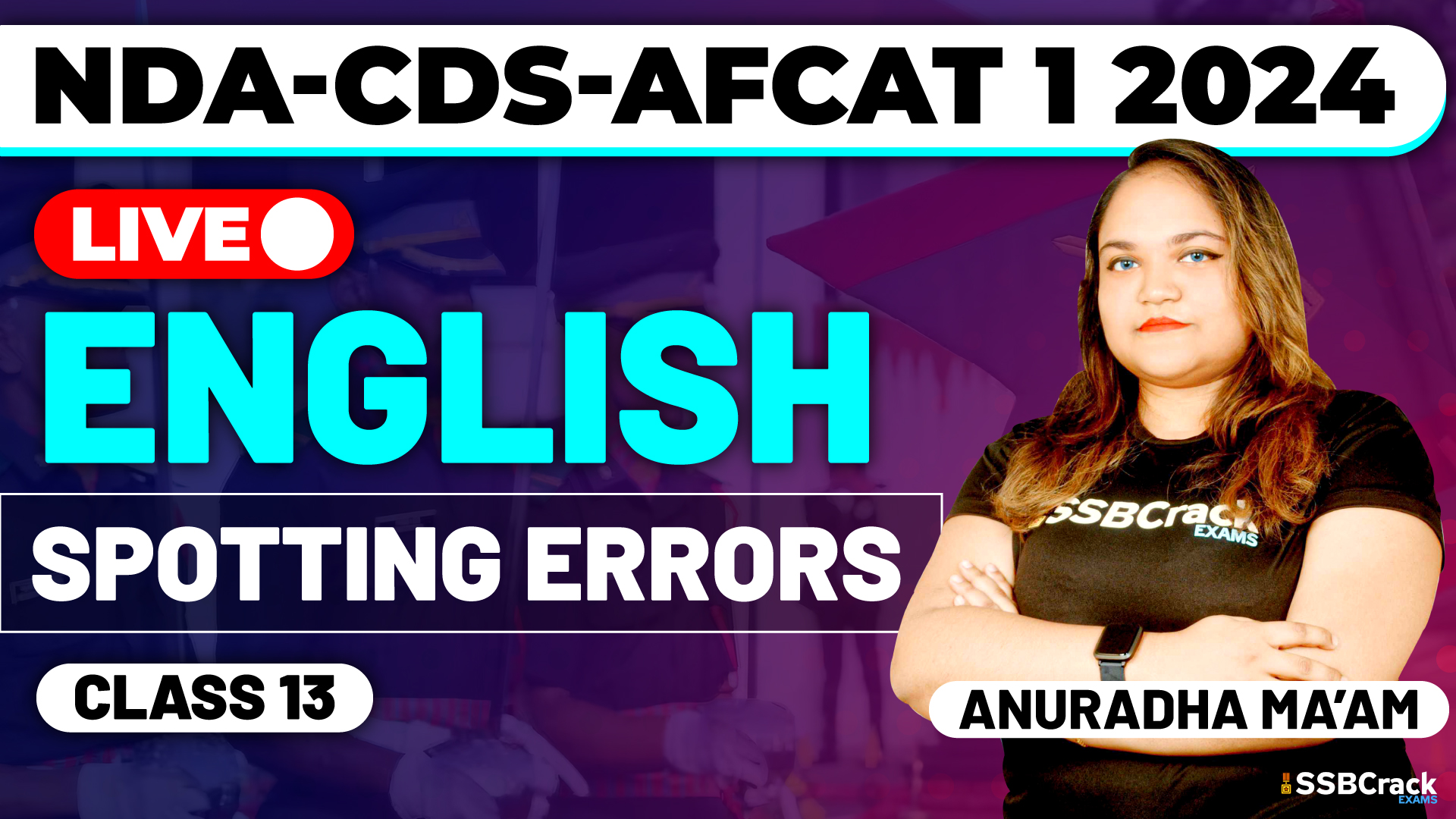In the dynamic landscape of competitive examinations such as the National Defence Academy (NDA), Air Force Common Admission Test (AFCAT), and Combined Defence Services (CDS), the “Spotting Errors” segment holds significant weight. Demonstrating proficiency in this section not only underscores your understanding of English grammar but also showcases your ability to discern subtle nuances in language. In this article, we will explore key strategies and insights to master Multiple Choice Questions (MCQs) related to spotting errors, as commonly encountered in these prestigious examinations.
Decoding the Instructions
The instructions for solving MCQs in the Spotting Errors section typically direct candidates to identify any error in the given sentence, which is divided into three parts marked as (a), (b), and (c). The task is to analyze each part for grammatical accuracy and mark your response on the answer sheet accordingly. If no error is found, the response should be indicated as (d).
Q) I hoped that the train (a)/ will arrive on time, (b)/ but it did not. (c) / No error (d)
Ans. (b)
Q) We looked after the thief, (a)/ but he was nowhere (b)/ to be found. (c)/ No error (d)
Ans. (a)
Q) I tried to meet the person (a)/ whom you said (b)/ was looking for me. (c)/ No error (d)
Ans. (b)
Q) Like many young (a)/ women living at homes, I can’t really (b)/ talk about my ideas or what I really feel, to my parents. (c)/ No error (d)
Ans. (b)
Q) He said that (a)/ he will help me (b)/ to secure a decent job. (c)/ No error (d)
Ans. (b)
Q) The criminal was (a)/ sentenced to death (b)/ and was hung for his crime. (c)/ No error (d)
Ans. (c)
Q) One of my uncles (a)/ is a doctor (b)/ in America. (c)/ No error (d)
Ans. (d)
Q) His car is (a)/ more bigger than (b)/ that of any of us. (c)/ No error (d)
Ans. (b)
Q) Yesterday I met an old friend (a)/ when I am going (b)/ to the market. (c)/ No error (d)
Ans. (b)
Q) He didn’t know (a)/ the difference from (b)/ a ship and a submarine. (c)/ No error (d)
Ans. (b)
Q) The future of food companies (a)/ seems quite secure (b)/ owed to ever-growing demand. (c)/ No error (d)
Ans. (c)
Q) The villagers fled away their houses (a)/ when they saw (b)/ the flood water rising. (c)/ No error (d)
Ans. (a)
Q) No sooner we entered (a)/ than he got up (b)/ and left the room. (c)/ No error (d)
Ans. (a)
Q) Death (a)/ is preferable (b)/ than life. (c)/ No error (d)
Ans. (c)
Q) Neither Rakesh (a)/ nor I are leaving (b)/ for Hyderabad. (c)/ No error (d)
Ans. (b)
For more questions, check out NDA-CDS-AFCAT 1 2024 Exam English Live – Spotting Errors – Class 13
Strategic Approaches for Success
- Thorough Reading: Begin by reading the entire sentence carefully to understand its context and structure.
- Systematic Evaluation: Analyze each part (a), (b), and (c) of the sentence methodically, focusing on grammar, syntax, and coherence.
- Grammar Proficiency: Ensure a strong command of fundamental grammar rules, including subject-verb agreement, verb tense consistency, proper article usage, and accurate pronoun references.
- Consistency Check: Maintain consistency in the sentence structure, verb tense, and pronoun usage throughout the entire sentence.
- Contextual Understanding: Consider the context of the sentence to discern the appropriate choice, especially in cases where errors may be subtle and context-dependent.
- Elimination Technique: Employ the elimination method to rule out obvious incorrect options, thereby increasing the probability of selecting the correct response.
- Common Error Identification: Focus on common error types, such as incorrect verb forms, inappropriate word usage, and faulty parallelism, to spot errors efficiently.
- Precision in Answering: Ensure precise and accurate marking of responses on the answer sheet to avoid confusion and errors during evaluation.
Navigating Common Error Types
- Subject-verb agreement discrepancies.
- Pronoun-antecedent agreement errors.
- Inaccurate verb tense usage.
- Misplaced modifiers and unclear references.
- Inappropriate article or preposition usage.
- Lack of parallel structure in lists or comparisons.
Conclusion
Mastery of spotting errors MCQs necessitates not only a comprehensive understanding of grammar principles but also a strategic and meticulous approach to sentence analysis. By diligently applying these strategic guidelines, honing your grammar skills, and practicing regularly with sample MCQs, you can bolster your proficiency in this critical segment. Embrace the process of learning and refinement, recognizing that the development of these skills serves as a stepping stone to success in the NDA, AFCAT, and CDS examinations.







